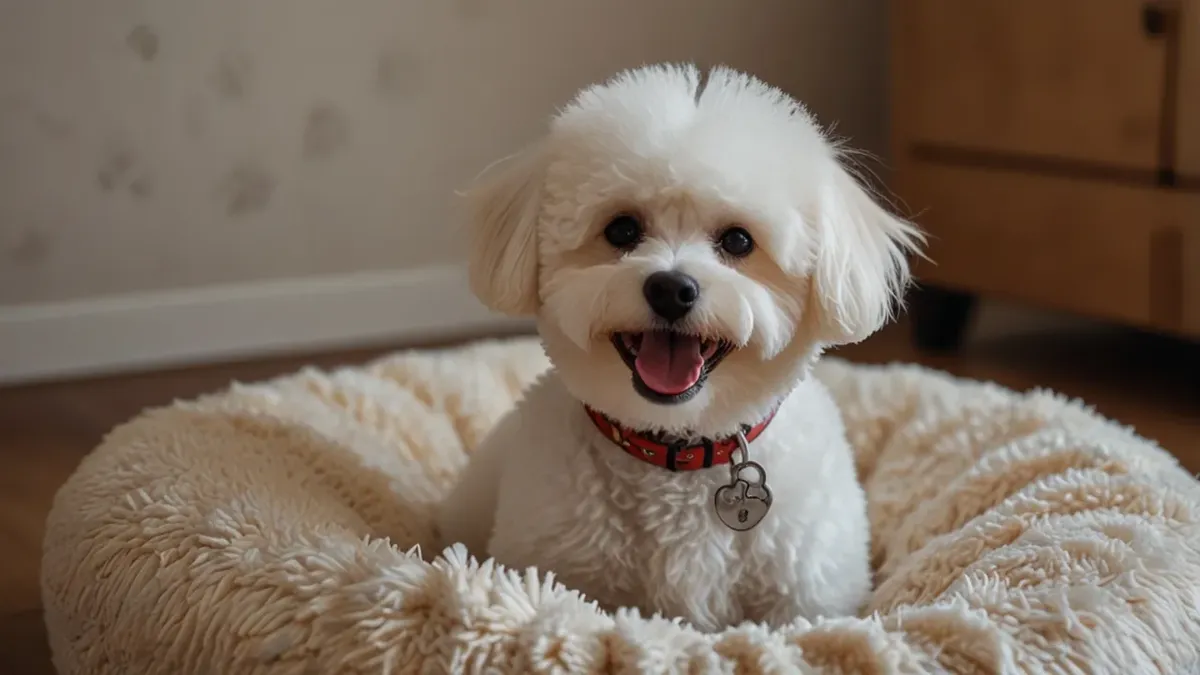In this Guide:
Published: January 21, 2025
Last Updated: October 28, 2025
How long do Bichon Frisé live?
Key Stages and Behaviour:
Puppyhood (0-6 months)
Bichon Frisé puppies are lively, curious, and eager to explore their world. This stage is crucial for their social and mental development. Early socialisation helps them grow into confident, well-adjusted adults.
Introduce them to various people, animals, and environments positively. Start basic obedience training during this period, using positive reinforcement to build good habits.
Adolescence (6 months - 2 years)
As they mature, Bichon Frisé may test boundaries while maintaining their playful nature. Consistent training and gentle guidance are essential during this stage.
This period is also marked by physical growth. Ensure they receive proper nutrition and moderate exercise to support their development.
Adulthood (2-7 years)
Adult Bichon Frisé typically settle into their happy-go-lucky personalities. They are known for their love of companionship and adaptability to various lifestyles.
Daily playtime, short walks, and interactive games are essential to keep them fit and mentally engaged. Regular grooming is a must to maintain their signature coat.
Senior years (7+ years)
As Bichon Frisé age, they may slow down and show signs of ageing, such as reduced energy or joint stiffness.
Adapt their exercise routine to their abilities, provide a balanced diet for senior dogs, and schedule regular veterinary check-ups. Pay close attention to dental care and overall health, as they can be prone to dental issues and other age-related concerns.
How much exercise do Bichon Frisé need?
Bichon Frisé are moderately active dogs who thrive on a combination of physical and mental stimulation to stay healthy and happy.
General needs:
- Daily walks: two short walks of 20-30 minutes each are ideal for Bichon Frisé.
- Indoor play: puzzle toys, fetch, or hide-and-seek provide mental stimulation for this intelligent breed.
- Garden time: if you have a secure garden, allow your Bichon Frisé to explore and play freely.
- Interactive games: keep them engaged with games that challenge their minds, such as treat-dispensing toys.
How easy are Bichon Frisé to train?
Training a Bichon Frisé is relatively straightforward, thanks to their intelligence and desire to please. However, they can sometimes exhibit a stubborn streak, so patience is key.
- Start early: begin socialisation and training during puppyhood to establish good behaviours.
- Use positive reinforcement: treats, praise, and gentle rewards work wonders with this breed.
- Stay consistent: set clear boundaries to help them understand expectations.
- Short sessions: keep training sessions brief and fun to maintain their interest.
- Mental stimulation: incorporate problem-solving activities to keep them engaged.
With dedication and the right techniques, your Bichon Frisé can become a well-mannered and delightful companion.
How friendly are Bichon Frisé?
Bichon Frisé are renowned for their sociable and affectionate nature.
- Loyal and devoted: they form strong bonds with their families and thrive on attention.
- Great with strangers: Bichon Frisé are welcoming and friendly toward new people.
- Social and playful: they enjoy interacting with people and other pets.
- Adaptable to children: their gentle temperament makes them excellent family dogs.
Do Bichon Frisés have health problems?
Like all breeds, Bichon Frisés can be prone to certain health issues. Awareness of these conditions helps ensure you provide the best care.
- Allergies: Bichons are prone to skin allergies, which can cause itching and discomfort. Regular grooming and a high-quality diet can help manage this.
- Dental issues: small breeds like Bichons often have dental problems. Routine brushing and dental checkups are essential.
- Patellar luxation: this knee condition is common in small dogs and may require monitoring or treatment.
- Bladder stones: Bichons are prone to urinary issues, so ensure they have a proper diet and access to fresh water.
- Eye problems: conditions such as cataracts or tear staining are common in Bichons.
Regular veterinary care and a healthy lifestyle can help mitigate many of these potential issues.
How expensive are Bichon Frisés to own?
Owning a Bichon Frisé involves some costs, particularly for grooming and veterinary care.
- Food: high-quality dog food for a Bichon Frisé costs approximately £20-£40 per month.
- Veterinary care: annual check-ups and vaccinations typically cost £200-£400 per year.
- Grooming: professional grooming every 4-6 weeks costs £40-£80 per session.
- Toys and accessories: expect to spend £50-£150 per year on toys and other essentials.
- Insurance: pet insurance for a Bichon Frisé ranges from £20-£50 per month.
Overall, the annual cost of owning a Bichon Frisé in the UK can range from £1,200 to £2,500 or more, depending on grooming needs and health care expenses. Major medical treatments, such as surgery for patellar luxation, can significantly increase costs without sufficient insurance coverage.
Bichon Frisés: the ideal dog for loving homes
Bichon Frisés are a fantastic choice for individuals or families seeking a cheerful, affectionate, and low-shedding companion. Their friendly and adaptable nature makes them well-suited to various living situations, from apartments to larger homes.
With the right care, grooming, and attention to their health needs, you’ll enjoy many happy years with your Bichon Frisé. These little bundles of joy can live up to 12-15 years, making them a long-term commitment but one that’s filled with love and companionship.
Help keep your precious Bichon Frisé safe — and your bills down — by purchasing dog insurance. Compare the top pet insurance providers and find the best deal for your furry friend!
Was this article helpful?



